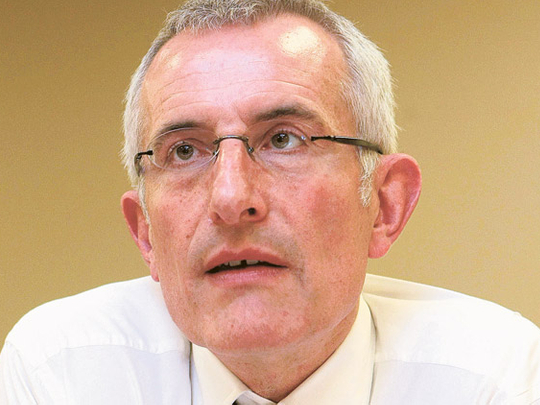
Dubai: Under EU regulations, it is no longer possible for state-owned rail operators to have a monopoly in their home countries. This has been the impetus for them to expand abroad, with the Gulf a key target.
The French National Railway — or SNCF (Société Nationale des Chemins de fer Français) — seems to be doing a good job of riding the Gulf railway network boom.
The €30.5 billion rail giant, with operations in 120 countries, is aggressively gunning for a slice of the $80 billion public transport projects earmarked for the Middle East over a ten-year span.
In an interview with Gulf News, Guillaume Pepy, chairman of SNCF Group, which is already working with the Roads and Transport Authority on the Dubai Metro project, discusses how the company plans to capitalise on the railway boom in the region.
Gulf News: What rail network projects is SNCF eyeing in the region?
Guillaume Pepy: First of all, there are a lot of local skills in the region now. So we should propose skills and technology transfers when it is necessary.
Here I am thinking about two or three areas, the first one being high-speed. There is a project in Saudi Arabia — the HRH project — and we are applying for this one.
The second area is mass transit and SNCF is the leader in the metro and tram industry. We are ready not only to be the engineer, but also to operate services if there is a need.
And the third area is freight. Cargo is one of our key expertise and I think it's a good priority for the GCC project to put freight first.
I am sure there is a need for an alternative to tug traffic. Freight is a definite priority.
Are you in talks with any firms in the UAE for potential deals?
We are already working with the RTA on the Dubai Metro project. SNCF's mass transit subsidiary, Systra, is the engineer of most of the local metro and light rail projects.
These include the Green Line, the Red Line, the tramway to Dubai Marina, and the monorail in Palm Jumeirah. So Systra is heavily involved in all the mass transit projects in Dubai.
What are your plans for the Etihad Rail project?
We are ready for other projects when there will be tenders. For now, we are not involved in the Etihad Rail project in any way. We will see when the tenders are released, which we see releasing in the next few months.
The railway is definitely the future of sustainable alternatives to roads and airlines, but it is a long-term investment.
What kind of investment is SNCF looking to make in this region over the next few years?
I am not able to discuss investment figures now. However, we have around 200 jobs in Dubai in engineering different mass transit projects at the moment.
And if there are PPPs (private public projects) here, we may be interested. For instance, there is such a project to be launched in Kuwait and we may be interested in that. It is to be launched in 2012.
Similarly, in the UAE, we may be interested if there are PPPs here. But this country has not chosen to go through PPP.
It is mainly by government-owned institutions. And public financing is a strong point in this country.
What percentage of your global revenues does the Middle East account for? How do you see that increasing?
Today it is marginal, of course, because this new ambition was started by this region only five years ago, except for Systra, which is very active.
Approximately between 15 and 17 per cent of Systra's global revenues come from the Middle East at present. But I think this figure is going to grow dramatically in the next ten years because I can see here that there is a global vision of a railway network — mass transit and classical lines. So I would see the current percentage double in the next ten years.
Middle East is talking of massive investments — worth $80 billion — in the public transport sector over the next decade. Do you see an effective GCC-wide rail network system in the future taking place?
It is very exciting because the GCC has a real and anticipated vision of the future of railways in this region. I think a GCC-wide rail network is extremely reasonable because when you think long term, you definitely need to have solutions to avoid congestion.
At the end of the day, you can't double your highways, you can't build new airports and you have the ports to evacuate the goods from airports. And there is only one reasonable solution, which is to have a good railway system. That is what has been done in Asia, in the US and in Canada.
What other countries in this region does SNCF plan to do business with?
Systra is operating almost everywhere because it is a leader in top level mass transit systems with engineering skills. As for SNCF, we are building now a high-speed line in Morocco.
This TGV in Morocco will be the first one in Africa and in some aspects, the skills we have in Morocco can be transferred to the Gulf in terms of climate, sand and other such difficulties.
Besides, we have a project in Saudi Arabia for TGV, for which we are competing.
Pepy playing a key role
Guillaume Pepy, who has been chairman of SNCF Group since February 2008, has been instrumental in overseeing the successful implementation of some of its strategic projects. Pepy is best known in the European rail industry as a leader in the high-speed rail business. He has been the driving force behind the further development of the famous TGV - today a key SNCF asset.
Pepy played a key role in building Railteam, a pan-European rail alliance to set up dedicated joint ventures, to operate passenger rail networks throughout Europe .












